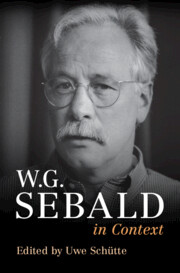Book contents
- W.G. Sebald in Context
- W.G. Sebald in Context
- Copyright page
- Dedication
- Contents
- Illustrations
- Notes on Contributors
- Preface
- Acknowledgements
- Note on Text
- Chronology
- Abbreviations
- Works by W.G. Sebald
- Part I Biographical Aspects
- Chapter 1 Allgäu
- Chapter 2 Grandfather
- Chapter 3 Manchester
- Chapter 4 East Anglia
- Chapter 5 Academia
- Chapter 6 The British Centre for Literary Translation
- Chapter 7 Between Germany and Britain
- Part II The Literary Works
- Part III Themes and Influences
- Part IV Reception and Legacy
- Further Reading
- Index
Chapter 3 - Manchester
from Part I - Biographical Aspects
Published online by Cambridge University Press: 24 August 2023
- W.G. Sebald in Context
- W.G. Sebald in Context
- Copyright page
- Dedication
- Contents
- Illustrations
- Notes on Contributors
- Preface
- Acknowledgements
- Note on Text
- Chronology
- Abbreviations
- Works by W.G. Sebald
- Part I Biographical Aspects
- Chapter 1 Allgäu
- Chapter 2 Grandfather
- Chapter 3 Manchester
- Chapter 4 East Anglia
- Chapter 5 Academia
- Chapter 6 The British Centre for Literary Translation
- Chapter 7 Between Germany and Britain
- Part II The Literary Works
- Part III Themes and Influences
- Part IV Reception and Legacy
- Further Reading
- Index
Summary
Sebald’s literary life began in Manchester. The short period he spent there (1966-70) left a lasting imprint on his writing, which this essay will explore through the three texts most directly inspired by the city: his 1967 poem ‘Bleston: A Mancunian Cantical’, the long prose poem Nach der Natur, and the fourth section of The Emigrants (‘Max Ferber’). These works reveal the aspects of Manchester most significant to Sebald: his encounters with an ‘industrial wasteland’, the Mancunian Jewish community, and Michel Butor’s 1956 novel, set in a fictionalized version of Manchester, L’Emploi du temps.
Keywords
- Type
- Chapter
- Information
- W. G. Sebald in Context , pp. 21 - 29Publisher: Cambridge University PressPrint publication year: 2023



